When hunting in the western states, the terrain is vast, open and hard to reach. Because of this, optics are an extremely important asset. To be more specific, good optics are important. In order to see bighorn sheep up in the deepest cirques behind the highest peaks, or mule deer feeding out of the dark timber across the canyon, a hunter needs an optic that will provide a superior edge to edge clarity, light transmission and resolution to help them claim success in the field. This is where Leupold’s SX-5 Santiam HD Angled spotting scope comes into play. I used this spotting scope through the hunting season this year, putting it through the ultimate tests. In the end, these were my thoughts:
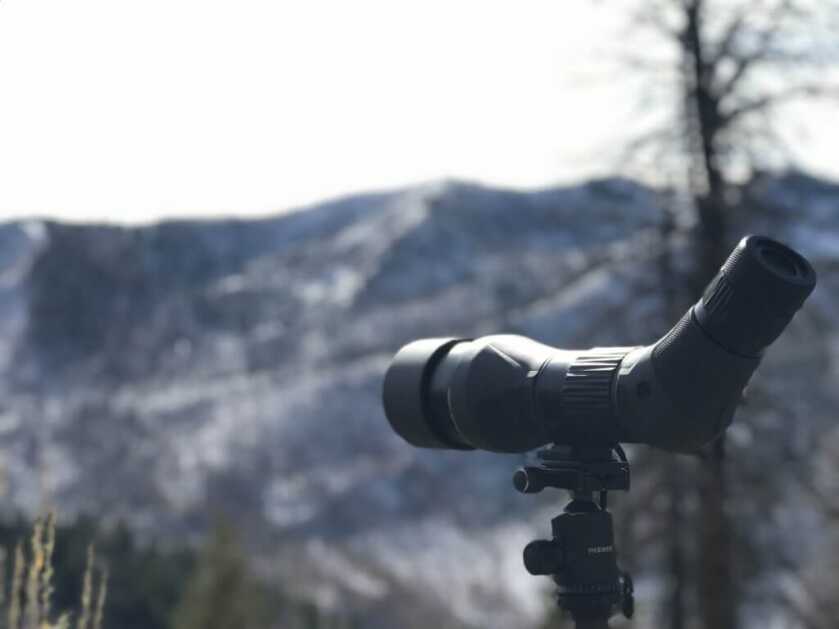
About the SX-5 Santiam HD
This spotting scope comes in two different varieties; angled and straight. Both optics are the same size, offering magnification in the 27-55x range while utilizing an 80mm lens. Like all of Leupold’s optics, these are guaranteed tough. If for some reason, you have any issues, you can return the optic to the factory in Oregon for repair under warranty. That said, you can see that this optic is built to take a beating. It has a rubberized coating that would absorb shock from a drop and resist wear and tear from riding around on a hunt with you. On top of this, the SX-5 Santiam HD features some advanced coatings that make the lens scratch-resistant and helps transmit the perfect balance of light wavelengths to the eye which provides you with the best image possible.
This optic is fitted with some notable features. For example, the 1/4×28 thread mount makes it compatible with most tripods. The SX-5 Santiam HD also comes with a single focus adjustment ring, making focus adjustments quick and smooth. It has an adjustable eyepiece that makes use with, or without glasses comfortable. And they also have an extendable sunshade on the objective lens, making it easy to get the clearest picture at any time of the day, from any angle.
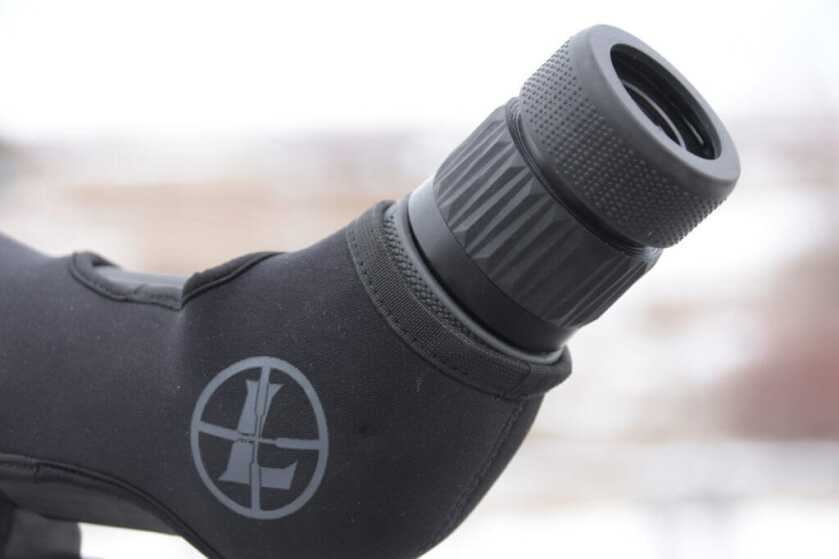
Angled vs Straight
Because the SX-5 Santiam HD comes in both angled and straight varieties, I guess it makes sense to discuss the differences. Put extremely simply, on an angled spotting scope, the eye is never looking in parallel with the objective lens. In a straight spotting scope, the eye is always in parallel with the objective lens.
This causes a couple of things to happen when in use: many people find locating an object in an angled spotting scope to be difficult, where it is easier for them in a straight spotting scope. However, angled scopes have a couple of benefits: you can scan the hillside while moving the eyepiece minimally (which also makes it a great option for a window mount in a vehicle) and you can hold your head at a comfortable angle while keeping the spotting scope low to the ground for stability. For the new user, straight scopes will remain more intuitive to find objects in, but I promise that you learn how to do the same with an angled scope after a little bit of use.
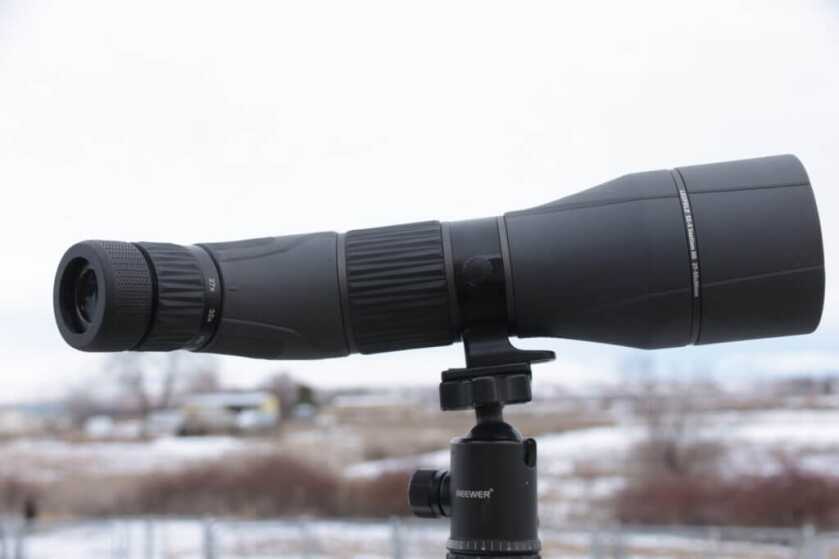
How I used my SX-5 Santiam HD
This hunting season, I carried this spotting scope and a tripod several hundred miles in a backpack while walking and riding on horseback. During this time, I spotted a ton of game, including antelope, deer, elk, bighorn sheep and others. For the most part, I was using the spotting scope in a supplemental fashion, first finding game with my binoculars and then studying it through the higher power SX-5. However, I found the SX-5 to be great for scanning the hillside over great distances and ended up using it to find game without the support of other optics.
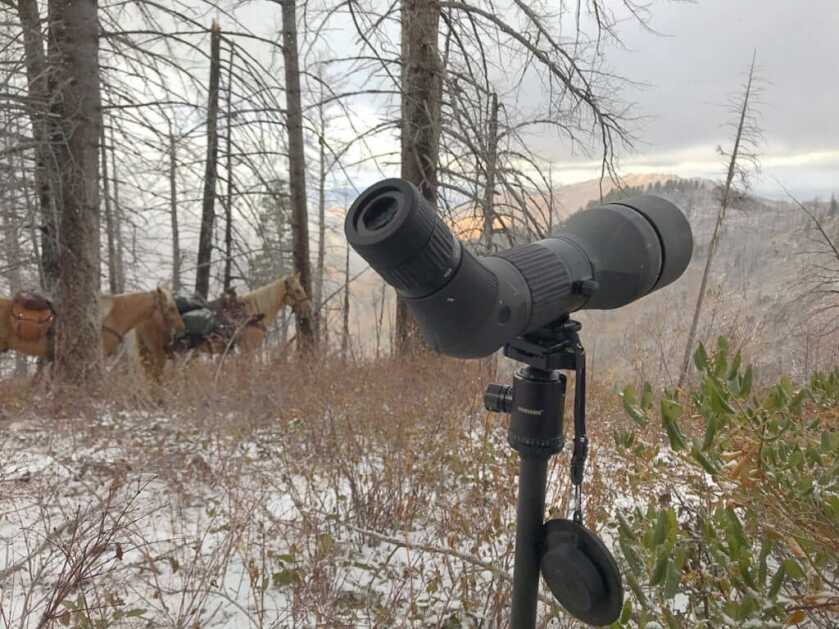
When combined with a PhoneSkope adapter and my phone camera, I was able to take video and pictures of what I was seeing. This allowed me to expand my use for the spotting scope to solo-spotting long-range shots, both during hunts and while practicing my shooting.
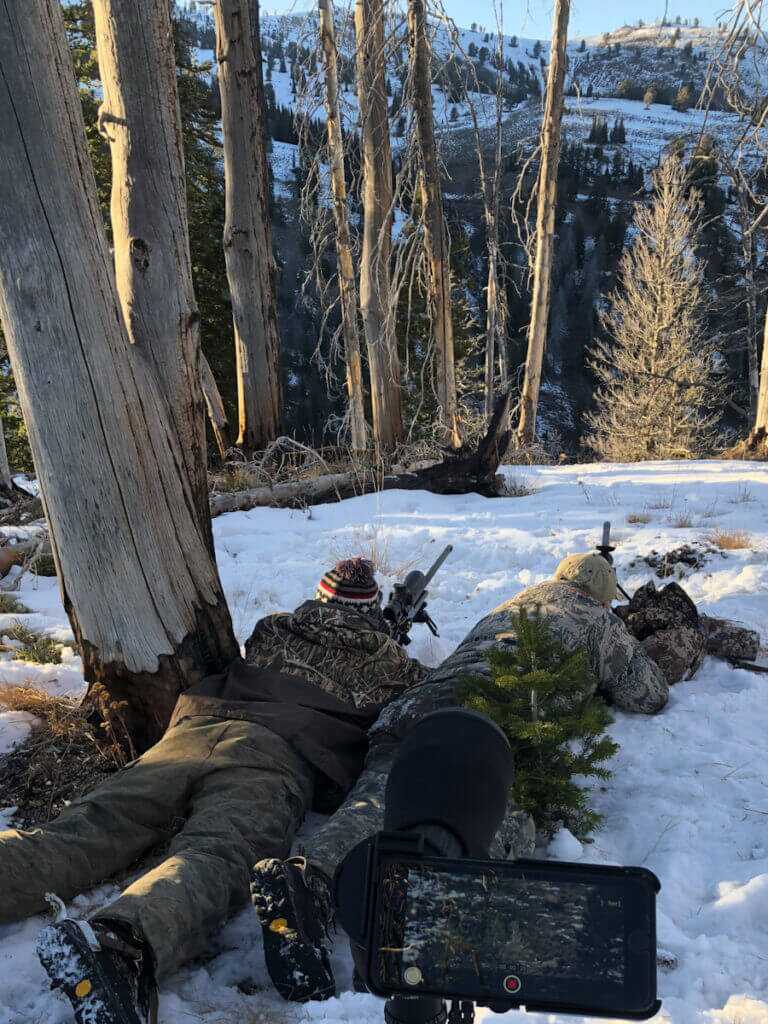
With the ability to record through the scope, I found it extremely valuable to have a clear optic. I was previously using a cheaper optic, and it would yield much worse pictures. Consequently, I just assumed that was the name of the game with digiscoping. Don’t cheat yourself with lesser quality! I’ll throw in a comparison between this old scope and the SX-5 as well as a short video of my dad taking a 191″ muledeer buck at 500 yards with a 6mm Creedmoor pistol (recorded through the SX-5).


While we were in the field hunting all of these elusive animals, we got rained on, snowed on, fogged in and froze up. Sadly, in order to continue the hunt, we had to expose our equipment to these elements too. The SX-5 performed like a champ, never yielding to nature. Day in and day out, I noticed the difference that the superior glass and large objective lens made in the early and late hours of the hunt. I found that I was able to see things with the SX-5 that I know I wouldn’t have been able to make out with other optics.
Power Range
There were occasions where I found myself wishing that I had a 20x base power, but with the clarity and FOV that the SX-5 had to offer, I welcomed the sacrifice. While spotting around 500-1000 yards, I didn’t often raise the power above 30x approximately. To count antler points and maintain a large sight picture on a (typically) moving animal, I found it more valuable to use a lower power. Again, I was able to do this because of the unreal clarity that the SX-5 had to offer.

While looking further away in the 1000+ yard range, I then would crank the power up to the highest possible while maintaining a decent FOV around the intended subject. Thanks to the precise adjustments that the focus ring had to offer, I was able to keep an edge to edge clarity on max power at extended ranges. In conclusion, I found the 27-55x power range to be fitting for my uses.
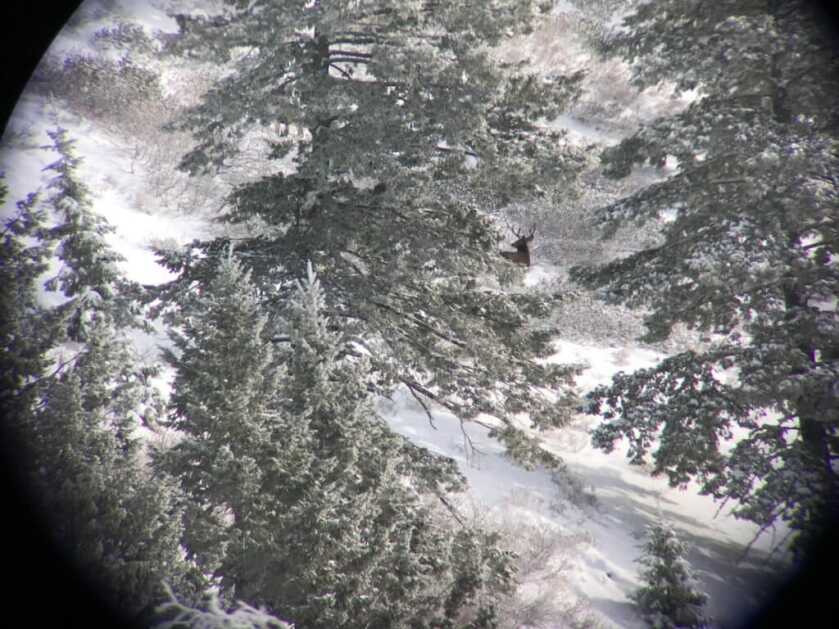
Specs And Features
- 2.9 – 1.5 exit pupil range
- 16.6 – 19.2 eye relief range
- 105 linear FOV (ft/1000 yards) on low power
- 68.7 oz weight
- 73 linear FOV (ft/1000 yards) on high power
- 15.7″ length
- 46.5 – 66.3 twilight factor
- 2 degrees angular FOV on low power
- 1.4 degrees angular FOV on high power
- 11′ close focus distance
- Lens Coatings:
- DiamondCoat 2
- Guard-Ion Lens Coating
- Protective Soft-Sided case
- waterproof and fog proof
- Advanced HD Lens System
- retractable lens shade
- twist-up eyecups
- Tripod ready (1/4×28)
- $2,339.99 MSRP
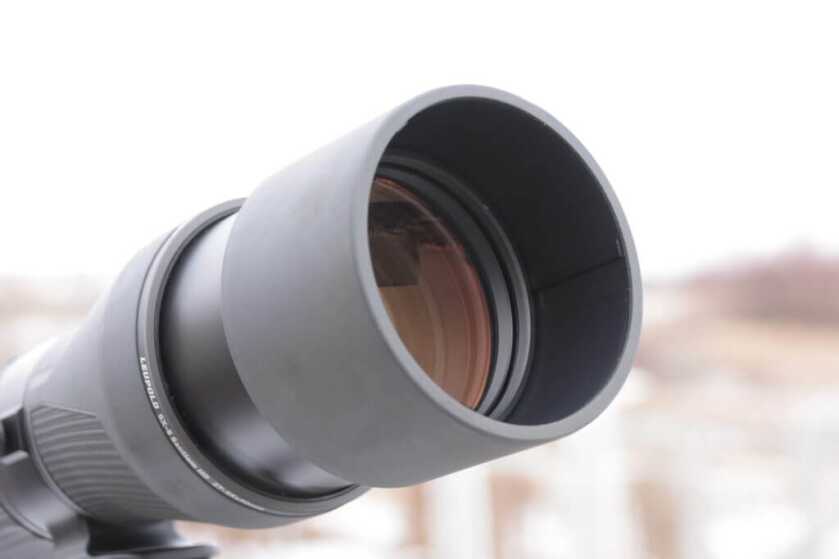
Final Thoughts
I’ve been struggling with lower quality spotting scopes for years now just because I wasn’t willing to fill the “Buy once, cry once” mantra. However, after using the Leupold SX-5 Santiam HD 27-55x80mm spotting scope, I’m never going to be able to go back to fighting with cheaper optics in the field. The added advantage of higher resolution, brighter image, and larger FOV is one that makes the difference between success and unfilled tags. The angled eyepiece version was the way to go for the way I hunt because it makes combing a large area from a single position possible and comfortable. The SX-5 has proven itself to be tough during my hunts with it, and when letting friends borrow this optic, it never once failed to drop their jaw on the ground when they looked through it. By the end of the day, Leupold has won its place at the top of the game with this optic for its clarity and light-gathering abilities among other reasons.




I would like to be kept informed about eexcellent condition Tom cats, various calibers, and laws of Texas including how to obtain a concealed weapons permit like Ihold for my recent move from Florida—- permit now expired but still have.
Is Leupold still making this stateside? I was saddened to see a new Leupold rangefinder was made in China. At least their scopes are still made here.